
Preet Bassi, CAE
CPSE Chief Executive Officer
by Preet Bassi, CAE
CPSE Chief Executive Officer
What would you imagine are some of the required elements for an effective strategic plan?
– Lots of in-person community feedback sessions? Sounds about right
– A multi-day internal stakeholder development session? Absolutely
– Lots of easel pads/post-its/white boards? Definitely
What if COVID-19 restricts all of the above? What could possibly replace them? That was the challenge (and opportunity) that the leadership of the Center for Public Safety Excellence (CPSE) found ourselves in last year.
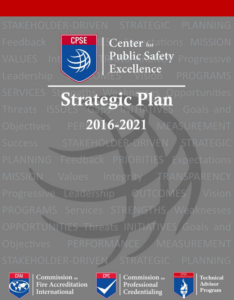 Core Competency 3A.1 of the Commission on Fire Accreditation 10th Edition Model asks departments seeking accreditation to have “a current and published strategic plan that has been submitted to the authority having jurisdiction.” At CPSE, we believe in applying the model to ourselves. So in 2015, we developed a strategic plan that would cover the period 2016 – 2021, presented it to the CPSE Board for approval, and posted it to our website. Each year, we use our Annual Reports to showcase our achievement of the goals set out in that strategic plan. We followed Category 3 – Goals and Objectives pretty much to the letter in the development and implementation of our previous plan.
Core Competency 3A.1 of the Commission on Fire Accreditation 10th Edition Model asks departments seeking accreditation to have “a current and published strategic plan that has been submitted to the authority having jurisdiction.” At CPSE, we believe in applying the model to ourselves. So in 2015, we developed a strategic plan that would cover the period 2016 – 2021, presented it to the CPSE Board for approval, and posted it to our website. Each year, we use our Annual Reports to showcase our achievement of the goals set out in that strategic plan. We followed Category 3 – Goals and Objectives pretty much to the letter in the development and implementation of our previous plan.
With our existing plan set to expire, in early 2020, we formed a CPSE Board Strategic Planning Subcommittee, developed an RFP, and began soliciting proposals from external facilitators. By the end of Quarter 2-2020, we realized that our original plan of developing a robust 5-year plan based on extensive stakeholder input was not going to be possible. Rather than delaying our strategic planning efforts, we decided to shift to a nimbler 2-year plan that would get us past COVID but still allow us to take needed action on critical areas.
New surveys and web listening sessions with the CPSE community were substituted with repurposing prior feedback, such as the late 2018 Stakeholder Report developed as part of the CFAI 10th edition rollout and the 21st Century Fire and Emergency Services White Paper. A multi-day in-person session became a 6-hour Zoom meeting. Zoom breakouts and a shared Google Sheet replaced small group discussions around an easel. With the help of our expert facilitator, we found that the above elements were just as helpful in developing an effective strategic plan.
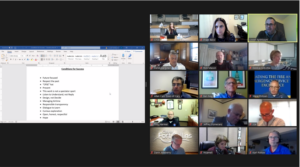
CPSE Leadership Strategic Plan Retreat
The CPSE Board of Directors, Chairs and Vice Chairs of both CFAI and CPC, and the CPSE senior staff met on December 10th, 2020. Prior to the meeting, all participants responded to a survey providing feedback on the next two years, specifically addressing:
– Where CPSE was well positioned to thrive?
– What should be the key places of focus and resource investment?
– What obstacles might CPSE face?
A review of the current Mission statement and development of new Vision statement was the first order of business. The group agreed that the current Mission statement continued to embody the organization. So, we dug into developing a new Vision statement and the results can be seen in the graphic below. The jigsaw imagery reflects how we, at CPSE, see our Vision, Mission, and Values fitting together and how one element is not complete without the others.
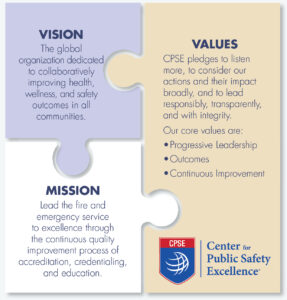
This session continued with the group identifying themes from the survey. The impacts of the COVID-19 pandemic emerged as a moment to be aware of, but not focused on. Being the overachievers that most of the strategic planning session attendees are, we shifted our gaze beyond the 2-year timeframe. We employed foresight to identify what areas of focus would lead to future growth. The group perceived growth in two ways: growth in agencies and officers we work with but also growth in who we are as an organization.
Greater and Broader Engagement and Collaboration, Meaningful Brand Awareness, a Multi-Step Path to Accreditation, and a Robust Digital Strategy will help us grow the number of agencies and officers we work while “collaboratively improving health and wellness outcomes in all communities.” Committing to greater Diversity, Equity, and Inclusion and launching a Center of Innovation will be key to our own growth as an organization and an evolution of how we “lead the fire and emergency service to excellence.”
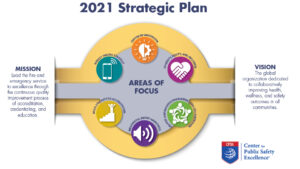
To effectively address the areas of focus, embody our mission, and achieve our vision, a set of four operational tenets were identified. These four tenets were collectively at play during 2020 as CPSE successfully weathered COVID-19 impacts to our operations. A continued focus on these tenets will be necessary in the years to come.
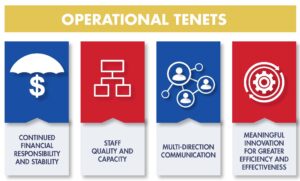
Our strategic planning work did not end on December 10th. Throughout Quarter 1-2021, we are taking each area of focus and bringing it to life. For each of the six areas, we are developing a success narrative and strategies and identifying resources needed and challenges to overcome. A CPSE Board Member is assigned to each area of focus as a champion and will work with CPSE staff, consultants, and members of the CPSE community to make the success narrative a reality. During Quarter 2-2021, CPSE will be scanning (via surveys, conversations, and/or research) before shifting to planning in Quarter 3-2021. Then come the implementation and evaluation phases. We look forward to sharing the results of the first year of the 2021-2023 Strategic Plan during the 2021 Annual Report and at the 2022 Excellence Conference.
While we are developing our new strategic plan in a very different way than the prior plan, we are equally excited for its implementation and hopeful that it will help us achieve our goals. In turn, by CPSE continuing to improve, we believe that we can provide our agencies and officers the tools they need to continue to improve both as organizations and as professionals.
Preet Bassi has been CPSE’s chief executive officer since 2014 and oversees work across all program areas with a focus on the organization’s strategic direction as set by the Board of Directors. Prior to CPSE, she was the Director of Finance and Administration for the International Accreditation Service and managed their Fire and Life Safety and Building Department Accreditation Programs. She has experience at both the local and state government levels, having worked for the City of Anaheim, California, and the California State Assembly.
Ms. Bassi holds a master’s degree in Public Administration from the University of Southern California, and a bachelor’s degree in Economics and Political Science from the University of California Davis. She is credentialed as a Certified Association Executive through the American Society of Association Executives. She was part of the inaugural cohort for the University of Pennsylvania’s Executive Program in Social Innovation Design and has completed Cornell’s Diversity and Inclusion eCertificate Program.
